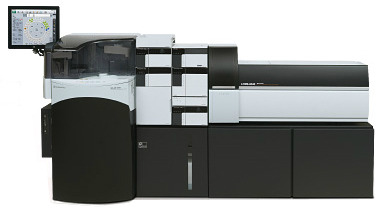
Shimadzu Scientific Instruments has launched the Clinical Laboratory Automation Module (CLAM-2000), a fully integrated sample pretreatment module for LC-MS.
The system automatically performs all of the processes necessary for analysing blood and other biological samples, from scanning in information from the blood collection tubes to sample pre-treatment and LC-MS analysis.
Automatic analysis is not only faster than manual analysis; it provides more precise results by reducing human error and improves laboratory safety and efficiency.
CLAM-2000 is claimed by Shimadzu to be the first truly integrated sample preparation system for LC-MS that allows users to process samples in an instrument that is directly attached to the LC-MS system, enabling a very simple and safe means for processing and analysis of samples.
The user need only place the blood collection tube or other sample in the system. All other processes are performed automatically, including loading the sample into the autosampler for LC-MS analysis.
System features include reagent management, calibration curve management, control management, and system maintenance management. Combined with a user-friendly interface, the features are designed to help ensure a workflow that provides reliable, rapid, and high-quality results.
Instead of standard batch processing, the CLAM-2000 module automatically processes individual samples successively in parallel. This gives researchers uniform pretreatment times and allows more efficient use of the mass spectrometer.
By automating operations such as dispensing, stirring, filtering, heating, and sample transfer, the system effectively improves data accuracy, and achieves the reproducibility needed for clinical research for new drug discovery and monitoring of drugs in blood.
With regards to lab safety, the CLAM-2000 removes many manual tasks requiring sample handling, and stores potentially infectious waste products inside the system, allowing it to be processed after analysis is complete.
“This system highlights the considerable progress made in the use of mass spectrometers for high-sensitivity detection in medical R&D,” said Scott Kuzdzal, general manager of marketing, Shimadzu Scientific Instruments.
“It is ideal for medical research centers, university medical departments, hospital pharmaceutical departments, and contract research organisations that are dealing with issues of variability in analytical results or laboratory efficiency. It can also effectively support forensic applications conducted by universities, research institutes and testing companies.”





